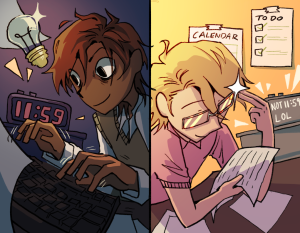Put the pro in procrastinate
April 10, 2023
Yes. After all, it’s called PROcrastination, isn’t it?
While passive procrastination is the result of unintentionally succumbing to anxiety and task aversiveness, active procrastination is the result of harnessing pressure and adrenaline. Compared to passive procrastination, which may be a source of stress for students, active procrastination is just like any other method of studying and working.
When you purposefully induce procrastination, you’ll find yourself working faster yet producing work of the same or higher quality. Parkinson’s Law is the idea that no matter how much work is assigned, it will stretch to fill all the time before the deadline. If a month is given to complete a project, it’s almost guaranteed that most of the work is done at the end, no different than if only a week was given.
Instead of prolonging this inefficiency and stress from the moment it’s assigned, it’s more productive to allot yourself a shorter amount of time towards the end. Working over a longer period of time actually results in negative productivity, supported by Stanford Computer Science Department’s explanation of the inverse relationship between productivity and time spent working.
In Tim Urban’s TedTalk, “Inside the Mind of a Master Procrastinator,” he describes how he reduces his overall stress by only working right before his deadlines and only letting stress accumulate then.
While procrastination might not be the best strategy when there are multiple high-pressure deadlines, it is a valid way to reduce prolonged and unnecessary stress in some cases.
Furthermore, the adrenaline rush and pressure that occurs towards a deadline forces you to prioritize. Perfectionist students will worry and continuously revise minute details that don’t matter, but under a time constraint, they are able to focus on the big picture and gain a greater understanding of the overall assignment requirements.
In fact, a professor at the University of Wisconsin randomly assigned participants to create business ideas immediately while others were given five minutes to play games. Independent evaluators rated the procrastinators’ ideas as 28% more creative. Controlling for gametime also revealed that the increased rating only occurred when they were assigned the task then put it off, evidence of increased creativity resulting solely from procrastination.
Not to mention, when student procrastinators eventually enter a workplace environment, they’re aided by their ability to avoid exploitation from employers. According to the Forbes article, “When Good Work Is Rewarded With More Work”, while working efficiently is often touted, the fact is that the faster you complete your work, the more work you’ll end up being saddled with.
Take Worker A and Worker B for example. Worker A finishes their tasks early, gets praised by the manager and might get a higher end-of-year bonus but is then assigned to more work. Worker B just barely finishes by the end of the day, might not get that bonus or promotion, but the reality is that they’re both paid the same salary even while B works less. If you’re not being sufficiently rewarded for efficiency, be selfish and don’t allow others to take advantage of you.
Not everyone’s mind works the same way, and for those who seek the thrill of deadlines and the boost of creativity, procrastination might just be the best method.
A study conducted by the Department of Psychology at Columbia University found active procrastinators compared to non-procrastinators display similar “control of time, self-efficacy belief, coping styles and outcomes including academic performance.”
As long as you can take control of your procrastination, it’s no worse than other ways of time management. Procrastination is more beneficial in many aspects as it reduces stress, increases efficiency and develops one’s ability to see the greater picture.
























































